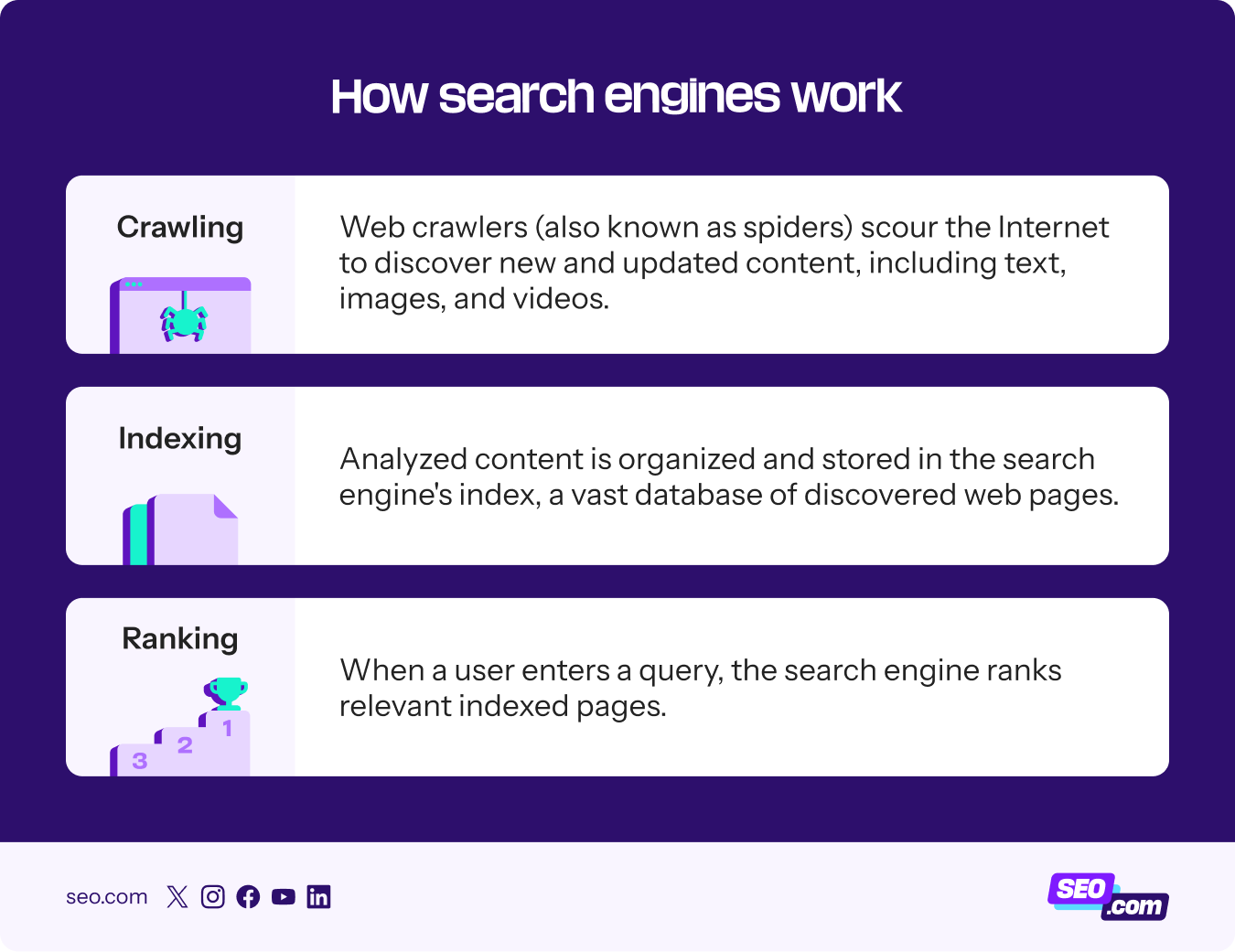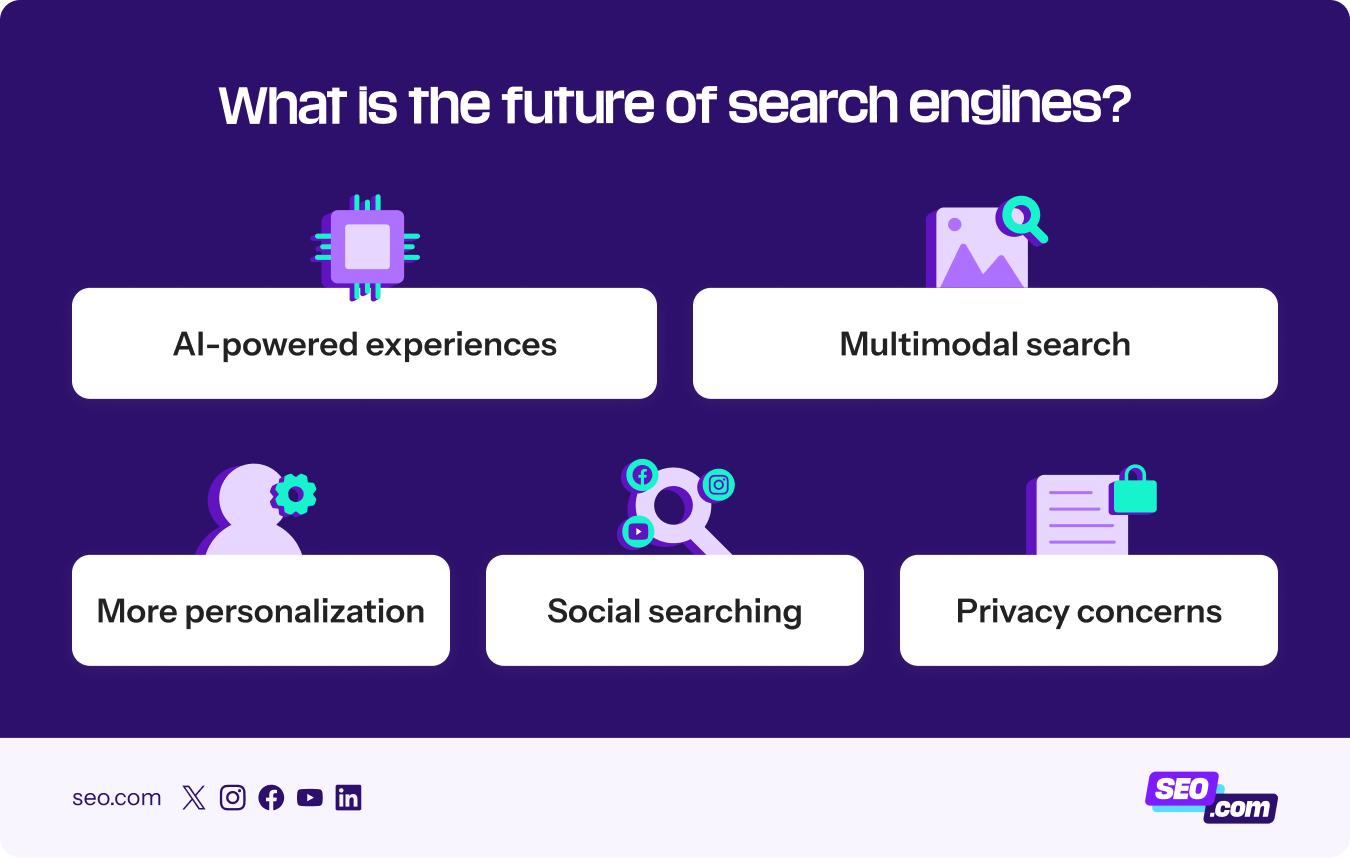Search engines are a part of our daily lives. Whether we are looking up interesting facts, checking a restaurant’s trading hours, or finding something interesting to do over the weekend, we just Google it. However, with the rise of social media, platforms like ChatGPT, and voice-activated assistants like Siri, we are seeing a shift in search engine use. Is Google becoming more of a verb than our go-to search engine, or are we just making the most of the variety of search engine vehicles available to us?
How does a search engine work?
A search engine uses automated programs called crawlers to visit websites and gather information about their content. It stores this data in an index, functioning like a giant catalog, allowing it to quickly find relevant information when you search.

When you enter a search query, the search engine flips through this index and ranks the results based on factors like popularity, relevance, and trustworthiness. Then, it shows you the most useful links to explore. As users’ needs and search styles change, search engines need to keep up, increasing their sophistication and natural language processing.
How have search engines evolved?
Search engines started out using simple algorithms that relied on keyword matching alone; we mainly used AltaVista and Yahoo! to find what we needed. With the internet’s expansion came a need to cater to users who would, and still do, feed this growth.

Google joined the landscape, revolutionizing it with its own algorithm. Rather than relying on keywords alone, the new PageRank algorithm ranked web pages based on the quality and quantity of links pointing to them. This shift made search results more relevant and trustworthy, setting a new standard for how information is organized and found online.
The rise of social media saw users using these platforms to pull in reviews, recommendations, and content that are more relevant to their social circles. Social searching makes results more community-focused, socially driven, and personalized, as users find relevant information based on trusted social connections.
A new era of search engine capabilities opened up with ChatGPT. Using OpenAI’s advanced artificial intelligence (AI) technology. It uses machine learning (ML) and natural language processing to understand user queries and facilitate a conversational approach to searching. This ability to understand conversational language further revolutionizes the search experience, setting a new standard for search engines to follow. So, what’s next?
What is the future of search engines?

Major players like Microsoft and Google are already using AI to cater to users’ search intent. Google launched AI Mode, plus AI Overviews, a new and improved AI-enhanced version of Google Search, which will increase publishers’ traffic, as clicks from AI Overviews are of higher quality than users have experienced before. To dive deeper, you can explore the future of AI Overviews.
We will see more sophistication with personalized experiences. Here’s what we are seeing and how these tools will grow in the future:
- AI-powered experiences: Instead of seeing only links, users will get direct answers, summaries, and more conversational interactions, like chatting with an assistant.
- Multimodal search: Search engines will grow visual search opportunities with tools like Google Lens, letting you search by snapping a photo.
- More personalization: With machine learning, search engines will better understand user intent, context, and preferences. Future searches will feel like curated experiences based on what you have previously interacted with.
- Social searching: Increasing social searching will push search engines to prioritize engagement and authenticity, blending online marketing efforts with social signals. These searches will become more dynamic, connecting users directly with content shaped by users’ social interactions.
- Privacy concerns: As search engines collect more data to improve personalization, there is growing pressure for more regulations, control over personal data, and transparency. Search engines will be forced to develop a balance between privacy and personalization.
Advances in personalization, AI, and voice or visual search require search engine optimization (SEO) to evolve too.
Learn more: Search Engine Facts & Statistics for 2026
Check if your site appears in AI Overviews
Want to check if your site is appearing in Google AI Overviews? Use our free AI Overview Checker to find out! Our AI Overview Checker also displays some crucial information for how organic results are informing the AI Overviews, and how your site can improve.
What is the future of SEO?
In response to the changing search engine landscape, the process of SEO will focus more on understanding user intent and delivering results with high-quality, relevant content. SEO strategies will also adapt strategies for different types of search inputs, like voice, video, and visual search. Overall, SEO will be more about enhancing the user experience, relying less on algorithms.
Search engine marketing (SEM) is next in the search engine growth chain. These strategies will need to leverage more data-driven insights to create ads that resonate with users.
What is the future of search engine marketing?
Search engines are pivotal marketing channels that help you connect with your customers.
The future of SEM will be shaped by changing consumer behaviors and AI automation. As AI integrates with search engines, machine learning will start to automate bidding, ad personalization, and audience targeting. This means more precise and efficient marketing campaigns.
SEM will incorporate more voice and visual search opportunities, so marketers will start to focus more on engaging, interactive ads. This strategy shift will create more dynamic, smarter, and increasingly user-centric ads.
Learn more:
Navigate the search engine landscape with the pros
The future of search engines is rapidly evolving, with AI set to play a key role in how we find information online. The way we search is changing, and soon it will feel less like information-hunting and more like having a conversation with your personal assistant. Together, SEM and SEO will become even more integrated, providing users with engaging, relevant, and seamless experiences, driven by evolving consumer preferences and search technologies. Adapting to this new conversational landscape requires a specialized strategy, and generative engine optimization services are specifically designed to prepare your business for this next evolution of search.
Let your organization’s SEO efforts grow alongside the search engine landscape with our comprehensive SEO services. Contact us online today to get started!

Future-Proof Your SEO Strategy with OmniSEO®
Goodbye search engine optimization, hello search everywhere optimization.



Future-Proof Your SEO Strategy with OmniSEO®
Goodbye search engine optimization, hello search everywhere optimization.

Future-Proof Your SEO Strategy with OmniSEO®
Goodbye search engine optimization, hello search everywhere optimization.
Writers

What to read next
- Feb 19, 2026
- 8 min. read
- Feb 18, 2026
- 8 min. read




